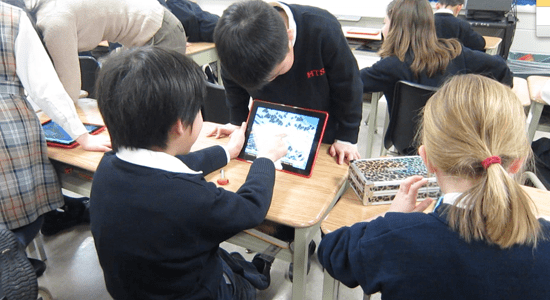An independent school in the GTA is pushing the boundaries of conventional learning by teaching grade three students social studies using the game “SimCity” on the iPad.
Holy Trinity School (HTS), located in Richmond Hill, began testing hot new technologies such as computer tablets in September 2011 for different subjects and different grades. HTS’ technology integration leader, Vince Delisi, says the pilot program has been very successful so far.
“It’s a matter of the technology being able to do things in the classroom that you can’t do in any other way. The technology assists in learning in certain ways and at certain times,” Delisi said.
Delisi was hired by HTS specifically to find ways to utilize new technologies in the classroom. The game “SimCity” teaches students how cities operate versus rural communities by allowing them to create and manage their own virtual cities from scratch.
“They have to manage budgets. They have to know per cents,” Delisi said. “They have to know initially about residential, commercial and industrial zones and what goes into the zones.”
Delisi says having someone to implement new technologies and instruct teachers on how to use them makes all the difference in ensuring that it is used effectively in the classroom.
Kim MacKinnon, a lecturer at the University of Toronto’s Ontario Institute for Studies in Education, has also been keeping her eye on how emerging technologies, such Apple’s iPad or Samsung’s Galaxy tab, will impact the traditional classroom dynamic. She’s applied for funding for a project to introduce tomorrow’s teachers, her OISE students, to today’s hot new technologies.
“In a sense it sort of starts with them [teachers]. If you’re graduating people that aren’t comfortable using these technologies themselves in their classroom that naturally will lead to the fact that the kids aren’t using them in the classroom,” MacKinnon said.
Debbie Gordon founded the youth-based media literacy consulting practice Mediacs, and has created many workshops on media literacy for children. She says that classrooms are changing along with the ways children learn.
“All the research, certainly for very young children, suggests that it’s only through sense-making and helping children wrap perspective around this [technology] that they actually learn,” Gordon said.
According to Gordon, children will not be able to use the technology effectively unless they are taught how to use it. This is where teachers come in. Gordon believes teachers should be the mediator between these new technologies and the children using them for educational purposes.

